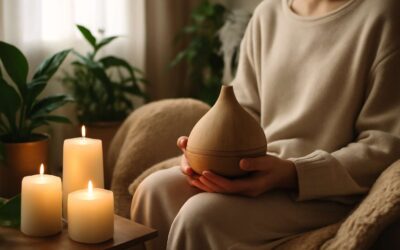The aromatherapy-centric wellness trend that’s swept Instagram (with 9 million posts under the hashtag #essentialoils) is all about using highly concentrated plant extracts to treat everything from anxiety and insomnia to inflammation and pain. Essential oils are extracted from different parts of the plants and then steam-distilled or pressed, capturing the phytochemicals that give the plant its distinctive fragrance. They can be inhaled, added to a carrier oil for topical application on the skin, consumed orally (though not all oils are safe for ingestion), or used as an ingredient in household cleaners and natural medicine treatments.
Because they’re so concentrated, it’s important to know how and when to use them. They should always be diluted before applying to the skin, and can also cause chemical reactions when inhaled undiluted. They’re most effective in the form of a diffuser, but can also be mixed with a carrier oil for massage or added to a bath for relaxation.
A drop or two of wintergreen, for example, can relax tight muscles during a massage. Bergamot can help improve hydration in the skin, while neroli has been linked to boosting collagen production for a youthful glow.
Using essential oils in the wrong way, however, can lead to burns, irritation and allergic reactions. Some essential oils should never be ingested, and many of the ones you can purchase in stores are too strong to be safe for direct application to the skin. Ingesting them can also disrupt gut bacteria and irritate the esophagus and stomach, and some are actually toxic.
Some essential oils — including oregano, frankincense and peppermint — may be useful for treating specific conditions, but more research is needed to prove these benefits. In a 2023 study, for instance, researchers found that diluted oregano oil reduced the severity of symptoms in patients with osteoarthritis better than a placebo.
Other essential oils, such as ylang ylang, lavender and chamomile, are said to calm, soothe and relax. While more research is needed on these claims, some studies are promising. In one, for example, researchers at Johns Hopkins found that certain essential oils killed a type of Lyme disease bacteria more effectively than antibiotics.
But before dipping your toe into the world of essential oils, make sure you talk to your doctor and do plenty of research. It’s also best to avoid them if you have a known allergy or health condition, as some can interfere with your medications.


0 Comments